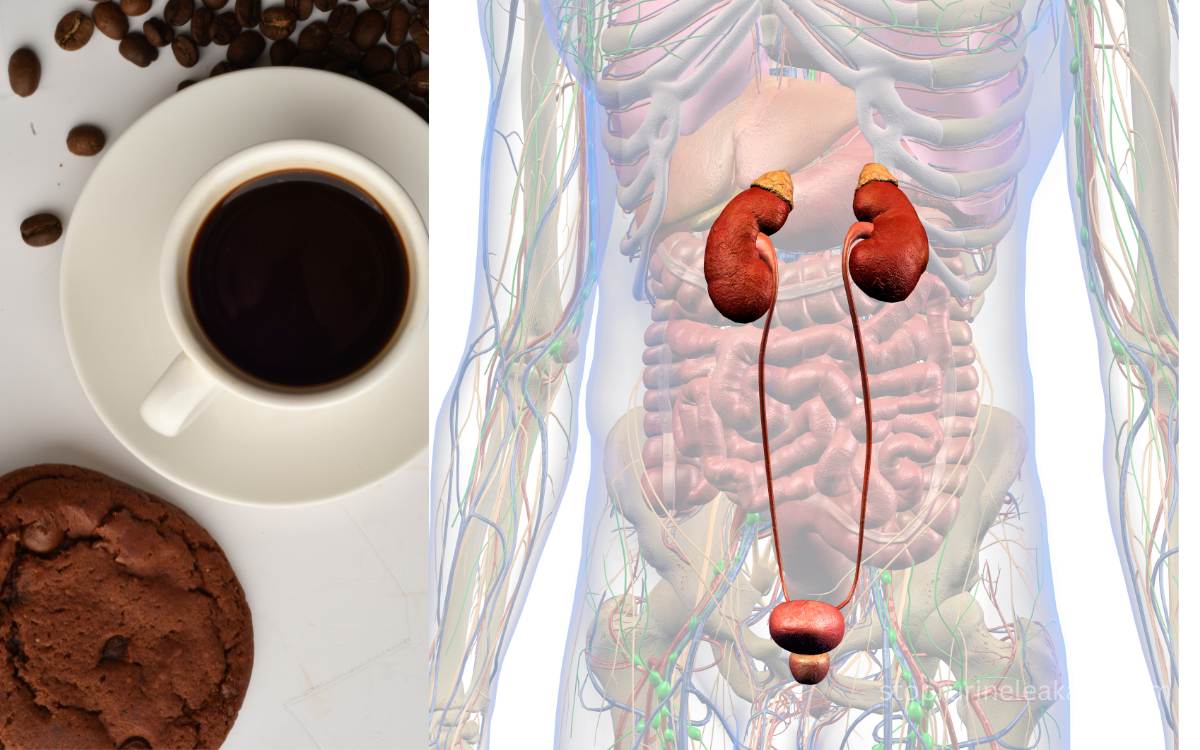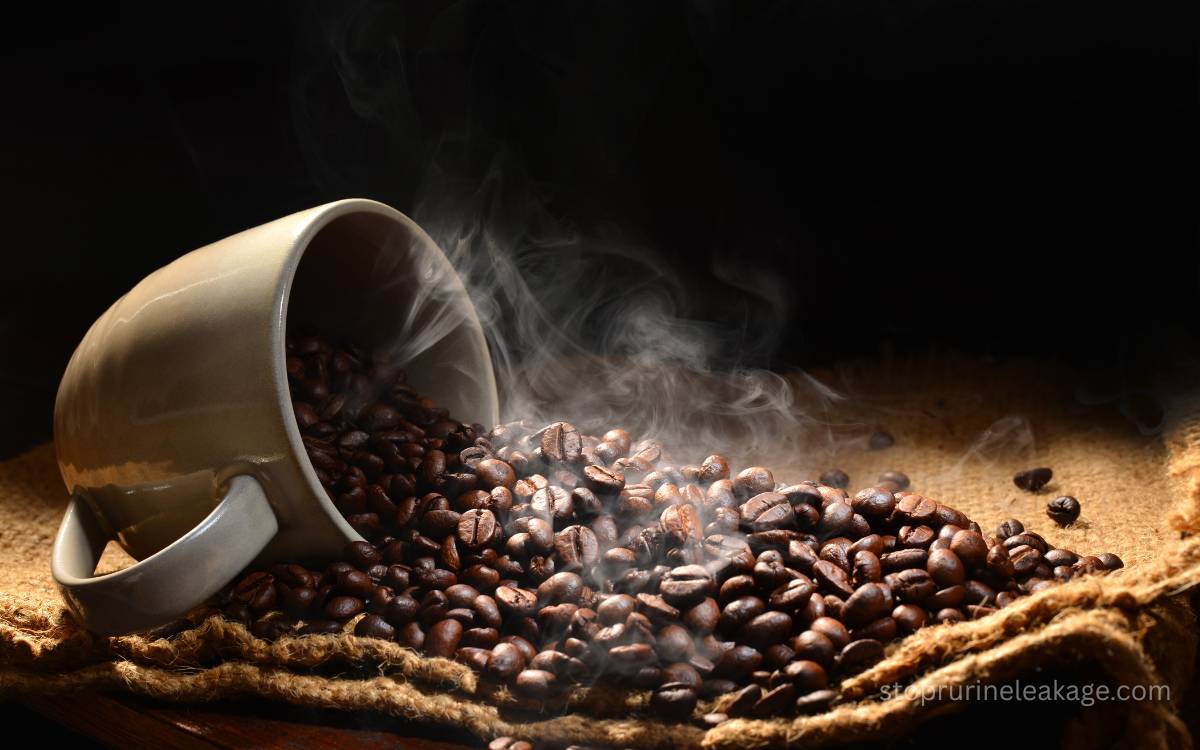Does Caffeine Affect Urination: Coffee and Pee
Does caffeine affect urination? Yes. It does. Strongly.
Think of your morning coffee. Hot. Bitter. Good. It wakes you up. You feel sharp. Then, soon, you feel it. The need. You must pee. Soon. And maybe again. This is no accident. Caffeine causes this.
Caffeine is a drug. A common drug. Found in coffee. Tea. Soda. Chocolate. It stirs your mind. But it also stirs your bladder. It acts fast.
Here is how it works: Your body makes a hormone. Called ADH. It tells your kidneys: “Hold water.” Caffeine fights this. It blocks ADH. Your kidneys get no signal. They let water pass. They make more urine. Quickly.
This means more trips to the bathroom. It can irritate your bladder. Feel urgent. Feel uncomfortable. It can also dry you out. Dehydration is a risk. Especially with much caffeine. Or hot days.
Understand this effect. It matters. For comfort. For health. For managing your day. Know what caffeine does inside you. Know why you need to go. Let’s look closer.
Caffeine vs. ADH: Why Your Coffee Makes You Pee
Does caffeine affect urination? Yes. Deeply. The fight happens inside you. A fight between caffeine and a hormone. ADH. Anti-Diuretic Hormone. Caffeine wins. You lose water. You need the bathroom.
ADH: The Water Keeper
Your brain makes ADH. The pituitary gland makes it. ADH is the boss. It tells your kidneys: “Hold water.”
When you need water, ADH rises. It shouts to your kidneys: “Save every drop! Send water back to the blood!”
Your kidneys obey. They use tiny gates. Aquaporins. These gates grab water from urine being made. They push it back into your blood. You stay hydrated. Urine stays concentrated. Dark. You pee less.
Caffeine: The Blocker
Caffeine enters. It is strong. It is clever. It goes to your brain. It finds the pituitary gland.
Caffeine says: “Stop. Make less ADH.”
The gland slows down. ADH levels drop.
The message to the kidneys weakens. “Hold water?” The kidneys are unsure. They stop listening so well.
What Happens in the Kidneys
No strong ADH signal. The aquaporin gates close. Fewer gates open.
Water cannot escape the urine being made. It stays trapped.
The kidneys let the water flow out. Into the bladder.
More urine is made. Fast. Weak. Pale.
The bladder fills quickly.
The Body’s Reaction
You feel the fill. Sooner. Stronger.
The bladder muscle gets jumpy. Caffeine pokes it. Makes it tense.
You feel urgency. A sharp need. “Go. Now.”
You go. Often.
How Much Caffeine Causes This?
| Caffeine Source | Approximate Caffeine (mg) | Effect on Urination |
|---|---|---|
| Brewed Coffee (8 oz) | 95 | Often strong effect. More trips likely. |
| Black Tea (8 oz) | 47 | Noticeable effect. Urgency possible. |
| Cola (12 oz) | 34 | Mild to moderate effect. Depends on speed. |
| Energy Shot (2 oz) | 215 | Very strong effect. Frequent urination. |
| Dark Chocolate (1 oz) | 24 | Very mild. Usually not noticeable alone. |
Who Feels It Most?
-
New Drinkers: Your body is not used to the fight. It reacts strongly.
-
Big Doses: More caffeine? Stronger block on ADH. More urine.
-
Sensitive Bladders: If you already feel urgency often. Caffeine makes it worse. Like pouring water on fire.
-
The Dehydrated: Hot day? Sweating? Caffeine steals more water you need. Bad mix.
Signs Caffeine is Blocking Your ADH
-
More Trips: Peeing often. Soon after drinking coffee or soda.
-
Sudden Need: That “can’t wait” feeling. Hits hard.
-
Pale Pee: Urine looks light. Like water. Means little water is being saved.
-
Night Wakes: Getting up to pee at night. After evening caffeine.
-
Dry Mouth: Feeling thirsty soon after. Even while drinking. Caffeine drains you.
The Other Pokes: Bladder and Blood
Caffeine does not stop with ADH. It is busy.
-
Bladder Irritation: Caffeine pokes the bladder wall. The detrusor muscle. It makes the muscle twitchy. Ready to squeeze. This adds to the urgency. Makes the “need” feel sharper.
-
Blood Flow Rush: Caffeine makes your heart pump harder. Pushes more blood. More blood reaches the kidneys. More fluid arrives to be filtered. More urine is made. This adds to the flood from blocking ADH.
What You Can Do
-
Know Your Dose: See the table. Track what you drink. How much caffeine?
-
Slow Down: Sip slowly. Don’t gulp three coffees fast.
-
Water Chaser: Drink water with your coffee. Or right after. Fight the drain.
-
Listen to Your Bladder: Feel worse after two coffees? Stop at one. Or try decaf.
-
Cut Back if Needed: Trouble with leaks? Night trips? Try less caffeine. Or none. See if it helps. Often it does.
The Simple Truth
Caffeine blocks ADH. ADH saves water. No ADH signal? Water flows out. You make more urine. Fast.
Caffeine also pokes the bladder. Makes it feel full sooner.
More urine. Plus a jumpy bladder. Equals many trips.
Understand this fight. Control your caffeine. Control your comfort. Drink smart. Pee less.
It is not magic. It is biology. Caffeine wins the fight against ADH. You hold the cup. Choose how hard the fight will be.
Caffeine vs. Your Bladder: The ADH Blockade (With Proof)

Does caffeine affect urination? Yes. It attacks a key hormone: ADH (Anti-Diuretic Hormone). Think of ADH as your body’s water foreman. Caffeine shuts him down. Urine production ramps up. You feel the rush. Science confirms it. Let’s break down the fight.
The Core Fight: Caffeine vs. ADH
Your brain’s pituitary gland makes ADH. Its job is simple: Save Water.
-
ADH On Duty (No Caffeine):
-
🧠 Signal Sent: “Kidneys! Hold Water!”
-
🚪 Kidneys Respond: Open “aquaporin” water gates in kidney tubes.
-
💧 Action: Pulls water back into your blood.
-
🟡 Result: Concentrated urine (darker), less pee. You stay hydrated.
-
-
Caffeine Attacks (ADH Blocked):
-
☕ Caffeine Hits: Tells pituitary gland: “Stop making ADH!”
-
📉 ADH Levels Drop: The “Save Water!” signal weakens or stops.
-
🚫 Kidneys Respond: Aquaporin water gates close or open less.
-
💦 Action: Water cannot be pulled back. It flows out with waste.
-
⚪ Result: Dilute urine (lighter), more pee produced fast. Bladder fills quicker.
-
ADH: The Water Saver vs. Caffeine: The Blocker
| Hormone/Action | Effect Without Caffeine ✅ | Effect With Caffeine ☕ | Result on Urine & Bladder |
|---|---|---|---|
| ADH Production | Normal 🟢 | Reduced ⚠️ | Less water conservation |
| Signal to Kidneys | “HOLD WATER!” 🔊 | Weak/None 🔇 | Kidneys ignore save order |
| Aquaporin Gates | Open 🚪 | Closed/Less Open 🚫 | Water flows out freely |
| Urine Concentration | Concentrated (Darker) 🟡 | Dilute (Lighter) ⚪ | More volume produced |
| Bladder Fill Speed | Normal Pace 🐢 | Faster Pace 🐇 | Urgency hits sooner |
The Urge Intensifies: Beyond Just ADH
Caffeine doesn’t stop at ADH. It pokes your bladder too.
-
🧠 Bladder Muscle Irritation (Detrusor Muscle):
-
Caffeine directly stimulates the bladder wall muscle.
-
It becomes twitchy, hypersensitive.
-
Feels Like: A sharper, more sudden “CAN’T WAIT!” urge. This adds to the urgency from extra urine.
-
-
❤️ Increased Blood Flow to Kidneys:
-
Caffeine makes your heart pump harder.
-
More blood rushes to the kidneys.
-
More blood = more fluid filtered = even more urine added to the flood caused by blocking ADH.
-
Science Weighs In: Diuretic? Yes. But How Strong?
-
The U.S. National Library of Medicine: Confirms caffeine is a diuretic.
-
Expert Voice (Dr. Russell de Souza): “Caffeine is a mild diuretic. It causes your kidneys to flush extra sodium and water.”
-
National Kidney Foundation: Notes the increase in urination is usually short-lived.
-
Why? While caffeine lingers (up to 10 hours), its peak absorption is fast (99% within 45 mins). The main diuretic surge happens relatively quickly after drinking.
-
The Overactive Bladder (OAB) Question: Does Caffeine Make It Worse?
Science says: Likely Yes, Especially for Sensitive Bladders. But it’s complex.
| Research Findings on Caffeine & OAB 🔬 | What it Means |
|---|---|
| ✅ OAB Treatment Guidelines: Often list reducing caffeine as a first step. | Medical experts see a strong link in practice. |
| ✅ Small Studies (e.g., 2014): Replacing caffeinated drinks with decaf reduced urinary frequency & urgency in women with OAB. | Direct evidence caffeine worsens symptoms. |
| ⚠️ Mixed Reviews (e.g., 2017, 2015): Some studies show caffeine reduction helps control; others find insufficient evidence, especially for incontinence. | Effect might be clearer on urgency/frequency than leaks. Individual variation is high. |
| ❌ Some Studies (e.g., 2016): Found no link between regular caffeinated coffee drinking and incontinence risk vs. never-drinkers. | Caffeine may not be the sole cause of leaks for everyone. |
The Consensus? If you have OAB symptoms (sudden urges, frequent trips):
☕ Cutting caffeine is a low-risk, high-potential-reward strategy. Try it.
Dehydration & Urine Color: The Myths
-
💧 Dehydration Risk (Low/Moderate Intake):
-
PLOS One Study (2014): Healthy men drinking moderate caffeine (≈ 4mg/kg body weight/day ≈ 2-3 cups for most) did NOT pee out more total fluid than they drank.
-
Expert View (de Souza): “Caffeinated drinks… don’t appear to increase the risk of dehydration.” Your body absorbs the fluid it needs.
-
⚠️ Exception: Very high doses or drinking caffeine while already dehydrated (hot day, exercise) can tip the balance.
-
-
🎨 Urine Color:
-
Caffeine probably won’t drastically darken or lighten your pee on its own.
-
Drinking lots of coffee/tea (fluid volume!) might make it slightly lighter. Not a major health concern.
-
The Bottom Line: Control the Flow
Does caffeine affect urination? Absolutely. It’s a double attack:
-
Blocks ADH: Kidneys make more dilute urine, faster.
-
Irritates Bladder: Makes urgency feel sharper.
Manage it:
-
Track Your Dose (See Table 1). >200mg/day (≈ 2 coffees) often triggers issues.
-
Listen to Your Body. Sensitive bladder? Cut back.
-
Hydrate Smart. Drink water with your coffee.
-
Troubled by Urgency/Frequency? Try less caffeine. Or none. It’s the simplest fix.
You hold the cup. You control the fight against the bathroom breaks. Know how caffeine works. Choose wisely.
References-
- Russell de Souza, ScD, RD, registered dietitian, nutritional epidemiologist; associate professor, Department of Health Research Methods, Evidence & Impact, McMaster University, Hamilton, Ontario, Canada
- U.S. National Library of Medicine: “Caffeine”
- National Kidney Foundation: “Keep Healthy”
- Lower Urinary Tract Symptoms: “Pathophysiology of Refractory Overactive Bladder”
- Mayo Clinic: “Overactive Bladder: Symptoms & Causes”
- Journal of Wound, Ostomy, and Continence Nursing: “The Effect of Caffeinated Versus Decaffeinated Drinks on Overactive Bladder: A Double-Blind, Randomized, Crossover Study”
- Neurourology and Urodynamics: “Are We Justified in Suggesting Change to Caffeine, Alcohol, and Carbonated Drink Intake in Lower Urinary Tract Disease? Report From the ICI-RS 2015”
- Cochrane Database of Systemic Reviews: “Lifestyle Interventions for the Treatment of Urinary Incontinence in Adults”
- BMC Urology: “Coffee and Caffeine Intake and Risk of Urinary Incontinence: A Meta-Analysis of Observational Studies”
- PLoS One: “No Evidence of Dehydration With Moderate Daily Coffee Intake: A Counterbalanced Cross-Over Study in a Free-Living Population”
- Cleveland Clinic: Caffeine: How to Hack It and How to Quit It



